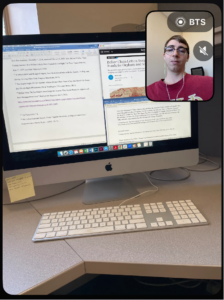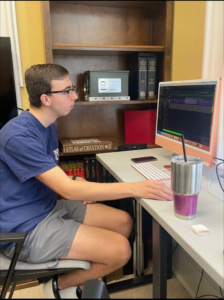Trevor Linn, from Cozad, Nebraska, graduated from Nebraska Wesleyan University in 2023 and is entering his second year of the REL MA.

During my undergraduate degree at Nebraska Wesleyan University, the Archway Curriculum required that I take at least three different writing instructive classes—First Year Writing, Lower-Level Writing Instructive, and Upper-Level Writing Instructive. In these classes I learned how to construct a thesis statement, synthesize evidence, and revise my work for a more cohesive paper; however, the classes did not teach me the wide applicability of these skills. My professors explained to me the importance of being a good writer, but never discussed how much the skills learned in writing (such as idea development, organization, and an eye for detail) can actually be applied beyond traditional writing—especially the skill of revision. During this past semester, however, two opportunities I had (interning for the Acquisitions Department of the University of Alabama Press [UAP] and editing podcast episodes for Dr. Newton’s Decoding Diaspora digital project) had me apply the skills of revision beyond the essay assignment where I first learned them.
The MA in Religion in Culture at the University of Alabama is committed to helping its graduate students prepare for a wide variety of careers after graduation, and one way that I chose to take advantage of this was through an internship with the Acquisitions Department of UAP. In my role as an intern to Assistant Acquisitions Editor, Kristen Hop, I was tasked with going through several of the book projects she was working on, to check for inconsistent formatting in the document, improper citation style in the references, and to write project descriptions of the books for the Press’s online project management software. Each of these tasks required an eye for detail that revision requires and the ability to think like the author in my search for errors and inconsistencies in the manuscript. Through that work I realized how much effort goes into a book, past the physical writing of it, and how many people look at it to find errors and necessary revisions (e.g., peer reviewers, editors, and interns). I soon learned how every book project is a group project. Thus, I realized how important it is to have the skill of revision in the professional world of writing when you are not the primary author. For, in order to help develop a book to the best it can be, everyone has to possess the same skills in the writing process, which means that when the project ended up on my desk it was necessary that I had the same skills as the author because the book was now partly my own. While I may not have been the reviewer checking for accuracy and theoretical soundness in the book’s content, my skill of revision allowed me to catch errors in references, formatting, and to write clear project descriptions that would strengthen the book as well as pre pare it for the production and editorial teams.

Working on Decoding Diaspora had me spending many hours in the Religious Studies Digital Lab working with audio on post-production of podcast episodes. After working on just the first episode, I realized how pivotal the skill of idea development (which is part of the revision process) would be—as it ended up being my entire job for the project. When I began working on the project, I had thirteen episodes of previously recorded scripts but nothing else. So it was my job to develop them by adding additional sounds, fixing mispronunciations, etc., to turn the basic scripts into a finished products that would be both educational and entertaining. However, given that I was working with the pre-recorded audio (from the year before), when an issue in the scripts arose I could not have the speaker rerecord the script, if their vocal inflection seemed wrong or if they mispronounced something. I learned, though, that once I had their voice in an audio production software, such as Adobe Audition, I could make their voices do all sorts of interesting things. I could change their inflection to be closer to how I would have wanted the sentence to be said, patch together different pieces of the same sentence to make a better sound, or layer multiple sounds to create the scenes described by the speakers (that occasionally did double duty of hiding the errors I couldn’t fix). Yet, no matter what I did to revise and develop, the episodes required patience to listen to the audio and devise the right way to revise the script that I started with into a polished episode. Thus, as I reflect on the idea of revision after being part of Decoding Diaspora, I realize that revision is not just for writing, it’s for the digital world too.

Working with UAP and Decoding Diaspora showed me that revision is not just another phase of the writing process, but a vital skill that multiple professions require you to possess—even if it’s not directly listed on the job application. While the skill may be taught in English Composition 100 and talked about by professors concerning writing, there is a whole world of projects in which revision is a necessary skill. Thus, through continued practice and focus on the steps of developing a paper, one might just eventually revise a project that could be the next world-changing product.
Featured image credit: Grayscale Photography of Person Holding Pen by Todoran Bogdan from Pexels Free license